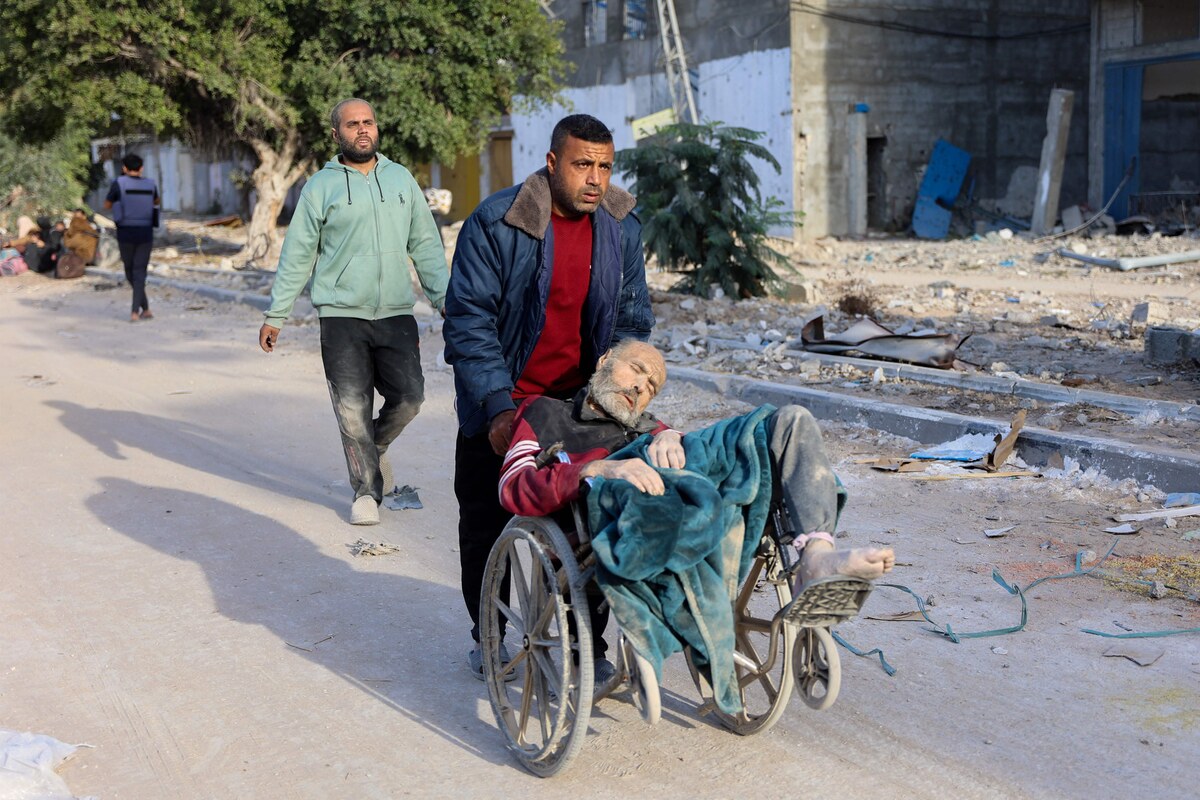DUBAI: Although the previous administration of US President-elect Donald Trump was seen as a staunch ally of Israel, Varsen Aghabekian Shahin, Palestine’s minister of state for foreign affairs and expatriates, says Palestinians remain hopeful about his return to the White House.
In large part this is due to a perception that the international climate surrounding the issue of Palestinian statehood is fundamentally different to that which prevailed during Trump’s last administration, owed in large part to events in Gaza and the resulting wave of solidarity.
“I have to be hopeful. We have to remain hopeful,” said Aghabekian Shahin during an appearance on the Arab News current affairs program “Franking Speaking,” a week after President-elect Trump secured a powerful mandate in a deeply polarized US election race.
Her optimism, however, is tempered by the decades of frustration that Palestinians have felt under Israeli occupation. “What we have been hoping for, as always, is a Palestinian state with our sovereignty and our self-determination,” she told “Frankly Speaking” host Katie Jensen.
While Trump’s first term was marked by controversial moves such as recognizing Jerusalem as Israel’s capital and relocating the US embassy there from Tel Aviv, Aghabekian Shahin believes there remains a possibility for change.
“With the incoming president in the United States, our hope remains the same. We hope President Trump will take a more balanced approach ... and put on his agenda the rights of the Palestinians.”

Aghabekian Shahin said she hopes the incoming administration of Donald Trump takes a more balanced approach to the Palestinian question. (Brad Penner-Imagn Images)
During his last administration, Trump championed normalization agreements between Arab states and Israel under the Abraham Accords. However, Aghabekian Shahin says “peace will not be sustainable if Palestinians’ rights are not taken into consideration.”
In contrast with the period coinciding with Trump’s last administration, Aghabekian Shahin says there is now a global momentum behind Palestinian statehood, catalyzed by shifting alliances and growing public outrage over Israeli actions in Gaza.
“I think times today are different than they were a couple years ago,” said Aghabekian Shahin.
“The ongoing genocide in Gaza, the mounting pressure and dissatisfaction all over capitals in Europe … and the coalition today led by Saudi Arabia on the materialization of the state of Palestine — these are new dimensions that cannot be ignored.”
Israel’s military campaign in Gaza came in retaliation for the Oct. 7, 2023, Hamas-led attack on southern Israel, which killed more than 1,200 and saw 250 taken hostage. The conflict in the tiny Palestinian enclave has resulted in more than 43,700 dead and 1.9 million displaced.
International criticism of the scale of destruction in Gaza has intensified over the past year, with many questioning Israel’s adherence to international law. Israeli leaders could face war crimes charges before the International Court of Justice and the International Criminal Court.
One positive to emerge from the conflict is renewed interest in the long-dormant effort to achieve the two-state solution to the Israeli-Palestinian conflict, which envisions an independent Palestinian state with East Jerusalem as its capital living peacefully alongside Israel.
Lauding Saudi Arabia’s diplomatic and humanitarian efforts, Aghabekian Shahin said a new international coalition spearheaded by the Kingdom to help expedite the two-state solution represented a source of hope for Palestinians.
This ambition was given further weight by the joint summit of the Arab League and Organisation of Islamic Cooperation that took place in the Saudi capital on Nov. 11, during which the leaders of 57 Arab and Islamic countries called on Israel to negotiate an end to the decades-old conflict.

Displaced Palestinians fleeing Beit Lahia in the northern Gaza Strip walk on the main Salah al-Din road on November 17, 2024, amid the ongoing war between Israel and Hamas. (AFP)
“Saudi Arabia has been extremely important for aid and its support to the Palestinian people,” said Aghabekian Shahin. “The summit that was held in Riyadh is a very important message. Fifty-seven countries were present in the meeting, with clear decisions and a focus on ending the occupation.”
Saudi Arabia has explicitly linked the normalization of ties with Israel to progress on Palestinian statehood. Aghabekian Shahin said this position is “a very important step and something that pushes forward and brings a lot of hope to the Palestinian people.”
During the recent joint summit, Saudi Crown Prince Mohammed bin Salman described Israel’s actions in Gaza as genocide, marking the first occasion that a Saudi official had publicly done so. Nevertheless, there are still several nations, including many of Israel’s Western allies, who have avoided using the term.
While acknowledging the scale of human suffering in Gaza, Aghabekian Shahin said the precise terminology is less important than addressing the atrocities that are taking place.
“Even if 300,000 people are killed in Gaza, God forbidding, some countries will not call it a genocide,” she said. “What is happening is a humanitarian catastrophe. ... Governments and people are more and more realizing that these atrocities cannot continue.”
Asked whether Hamas bears responsibility for triggering the carnage that has befallen Gaza, Aghabekian Shahin did not condemn the Palestinian militant group outright, focusing instead on the underlying conditions that have fueled the cycle of violence.
“Who takes the blame first and foremost is the belligerent occupation that has been suffocating Palestinian lives over seven decades,” she said. “Gazans were living in an open-air prison… When people as human beings are cornered and they don’t see a light at the end of the tunnel, then obviously violence erupts.”
Despite the grim reality of the situation and the intense animosity between the warring sides, Aghabekian Shahin underscored the importance of diplomacy and adherence to international law to resolve the conflict.
“Any violence perpetrated by any side is unacceptable,” she said. “We need to put violence aside and resort to mechanisms that will bring us closer to our liberation as per international law.”
This commitment to seeking peaceful solutions aligns with Aghabekian Shahin’s extensive background in academia, human rights advocacy, and as a veteran member of the Palestinian negotiations unit.
Before her ministerial appointment in April, she served in various roles, including as director of the Capacity and Institutional Building Project at the Office of the Palestinian President and commissioner-general of the Palestinian Independent Commission for Human Rights.
A member of Jerusalem’s Armenian community, Aghabekian Shahin has witnessed firsthand the pressures faced by minority groups in the city. She highlights the significance of the Armenian Quarter in the Old City, which has come under growing threat by far-right Jewish settlers.

As a member of Jerusalem’s Armenian community, Aghabekian Shahin has witnessed firsthand the pressures faced by minority groups in the city. (AN Photo)
“The land in question is invaluable,” she said, referring to a bitter ongoing legal dispute between the Armenian Patriarchate and an Australian-Israeli developer to lease an area of land in the Armenian Quarter to build a luxury hotel.
“This land is part and parcel of the heritage of the Armenian people for decades in Jerusalem,” said Aghabekian Shahin. “The community has a very good team of Israeli lawyers along with international lawyers who are working on the case.”
The Armenian Quarter in Jerusalem’s Old City has long been a symbol of Armenian identity and presence in the region. Aghabekian Shahin believes its preservation is vital not just for Armenians but for Jerusalem’s multicultural heritage.
The flight of Christian communities more broadly from Palestine and the wider Middle East is itself a bellwether of the decline of religious pluralism in the region. Aghabekian Shahin attributes this trend to the hardships of living under occupation.
“People are sick and tired of occupation,” she said. “They want a better future for their children. This better future cannot happen under occupation… With an end of occupation, there is an economic horizon and a future that people can look to.”
As Palestinians await clarity on the global stage, Aghabekian Shahin remains resolute. “What we hope for today is what we have always hoped for — a sovereign Palestinian state living in peace next to Israel.”
The stakes are high, however, not only for Palestinians but for the broader Middle East, where peace remains elusive. Aghabekian Shahin believes the next US administration will have to address the root causes of the conflict.
“Without justice for Palestinians, there will be no sustainable peace.”




























